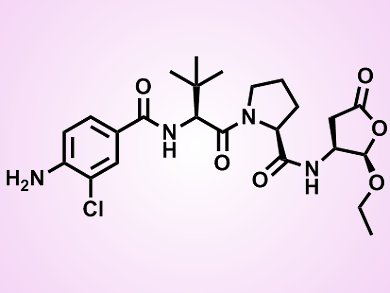AIDS (acquired immune deficiency syndrome) is a severe disease characterized by a progressive failure of the immune system. It is caused by HIV (immunodeficiency virus), a pathogen that infects immune cells (CD4 T cells) inducing them to die. Although numerous antiviral drugs have been developed, their efficacy is limited as HIV mutates, rendering it resistant to therapies.
By studying the mechanism underlying HIV-induced immune cell death, Warmer Green and co-workers, University of California, San Francisco, CA, USA, identified a potential new class of anti-AIDS therapeutics. The researchers demonstrated that VX-765 (pictured), a well-tolerated inhibitor of the enzyme caspase 1, blocks the destruction of immune cells that occurs during HIV infection.
As VX-765 targets a host protein rather than the HIV virus, it could potentially fight HIV infections without inducing drug resistance.
- Cell death by pyroptosis drives CD4 T-cell depletion in HIV-1 infection,
Gilad Doitsh, Nicole L. K. Galloway, Xin Geng, Zhiyuan Yang, Kathryn M. Monroe, Orlando Zepeda, Peter W. Hunt, Hiroyu Hatano, Stefanie Sowinski, Isa Muñoz-Arias, Warner C. Greene,
Nature 2013.
DOI: 10.1038/nature12940



